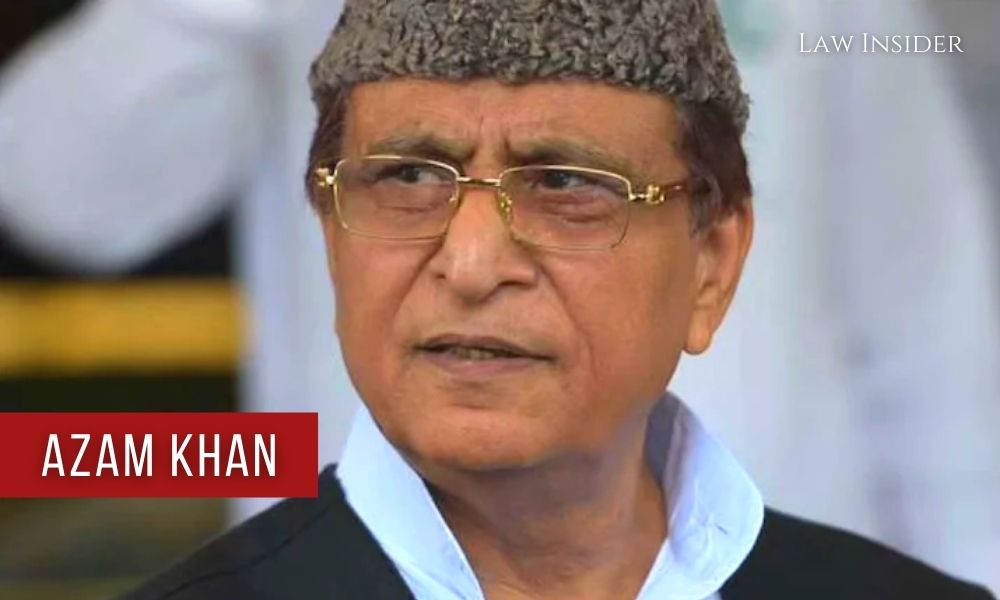Savvy Thakur
Published on: November 9, 2022 at 21:27 IST
In order for Samajwadi Party leader Azam Khan to petition the appellate court tomorrow for a stay of his conviction in the 2019 hate speech case, the Supreme Court asked the Election Commission of India to delay the notification of the bye-election for Rampur Assembly.
On October 27, Khan was found guilty in the criminal case.
As a result, he was disqualified under the Representation of Peoples Act of 1951, and the Rampur Assembly Constituency that he was representing was made a vacant seat.
On November 6, the ECI announced the schedule for Rampur’s bye-elections in a press release. The official gazette notification for bye-elections will be issued tomorrow, November 10, in accordance with the schedule.
With his appeal against his conviction still pending, Khan approached the Supreme Court to challenge the bye-election for the Rampur seat.
By directing the Additional Sessions Court Rampur to decide Khan’s application for a stay of conviction tomorrow (November 10), the Court granted his request.
ECI may announce bye-poll results on or after November 11 based on the Sessions Court’s decision on the application for a stay of conviction.
The order stated, “The issuance of gazette notification for declaring the election schedule shall be issued on or after 11.11.2022 depending upon the outcome of the application of stay on conviction,” and it was signed by a bench that included Justice Hima Kohli, Justice JB Pardiwala, and Chief Justice of India DY Chandrachud.
Khan’s attorney, Senior Advocate P Chidambaram, told the bench that the UP Legislative Assembly declared the Rampur seat vacant the day after Khan was convicted of hate speech on October 27.
He described the swiftness as “unprecedented.”
Chidambaram stated that despite the fact that a BJP MLA from the Khatauli constituency was sentenced to two years in prison by an order issued on October 11, no such action was taken to support his claim that the move was motivated by politics.
The senior lawyer noted that the official gazette notification for the byelections for the Rampur seat is scheduled to be published tomorrow and that the Election Commission of India issued a press release announcing the schedule.
The bench was informed by Chidambaram that Khan has filed an appeal against his conviction, for which he has been granted interim bail, and that the Sessions Court has scheduled a hearing on the application for a stay of conviction for November 15.
However, the ECI will inform the bye-elections in the interim.
For the Election Commission of India, Senior Advocate Arvind Datar argued that a conviction automatically results in disqualification under the Representation of Peoples Act of 1951.
He added that the Lily Thomas case overturned a provision in the RP Act that allowed for the freezing of disqualification while an appeal was pending against a conviction.
The bench, on the other hand, pointed out that if the conviction is stayed, the disqualification will also be stayed.
In order for Khan to take advantage of the opportunity to request a stay of his conviction in an appeal, the bench requested that the ECI postpone for three days the publication of the notification for bye-elections, which was originally scheduled for tomorrow.
“Allow him sufficient time. Give it three days to wait. If you don’t, you’re doing this selectively based on the convict’s political affiliation,” CJI Chandrachud told Datar.
CJI Chandrachud said that the ECI hasn’t done anything about the Khatauli seat yet.
“In other cases, like Khatauli, you didn’t do it. Give him a chance. Don’t if he doesn’t get the stay. However, give him one shot. Disqualification is eliminated once a stay is granted because conviction results in disqualification.”
CJI said, “You can’t pick and choose people.”
At this point, the bench asked Datar to get instructions from the ECI about whether Rampur’s bye-elections could be delayed and moved the hearing to 3 p.m.
Datar complained that delaying the bye-elections would be difficult when the bench was reassembled at 3 p.m.
“Not only for practical but also constitutional reasons, we cannot defer,” Datar stated.
He argued that the already-existing effect of disqualification will not disappear even if the conviction is overturned.
However, if Khan’s conviction is stayed, Datar argued, he can re-nominate for the bye-elections. If Khan’s argument is accepted, Section 8(4) of the RPA, which was overturned in the Lily Thomas case, will be reinstated.
However, the bench cited the ruling in Lok Prahari vs. Election Commission of India, which stated that the RP Act’s disqualification will not apply if an appellate court stays the conviction.
Datar countered that Khan will only be able to participate in the byelection if the stay of disqualification is granted, not the seat vacation that has already taken place because of the automatic disqualification under Article 191(1)(e) of the Constitution as Lily Thomas ruled.
“But the bench said it was hard for them to accept this idea. It sounds ridiculous. What does the stay of conviction serve? This is to ensure that the order of conviction’s consequences are erased.”
“There is no disqualification under 191(e) if the conviction itself is stayed. That is the subject of Lok Prahari”, as noted by CJI Chandrachud.
CJI added, “It is untenable that the operation of disqualification will continue despite the stay by an appellate court.”
A public servant whose conviction was stayed under the Prevention of Corruption Act was cited by Justice JB Pardiwala. The public servant cannot be fired if there is a stay on his conviction.
Using the same analogy, “you cannot proceed with disqualification when the conviction is stayed,” Justice Pardiwala observed.
“We will demand the meetings judge to take up the matter. He will make a decision today. Before proceeding to dictate the order”, the CJI stated, “If he fails to stay, gazette notification will be the day after tomorrow.”

